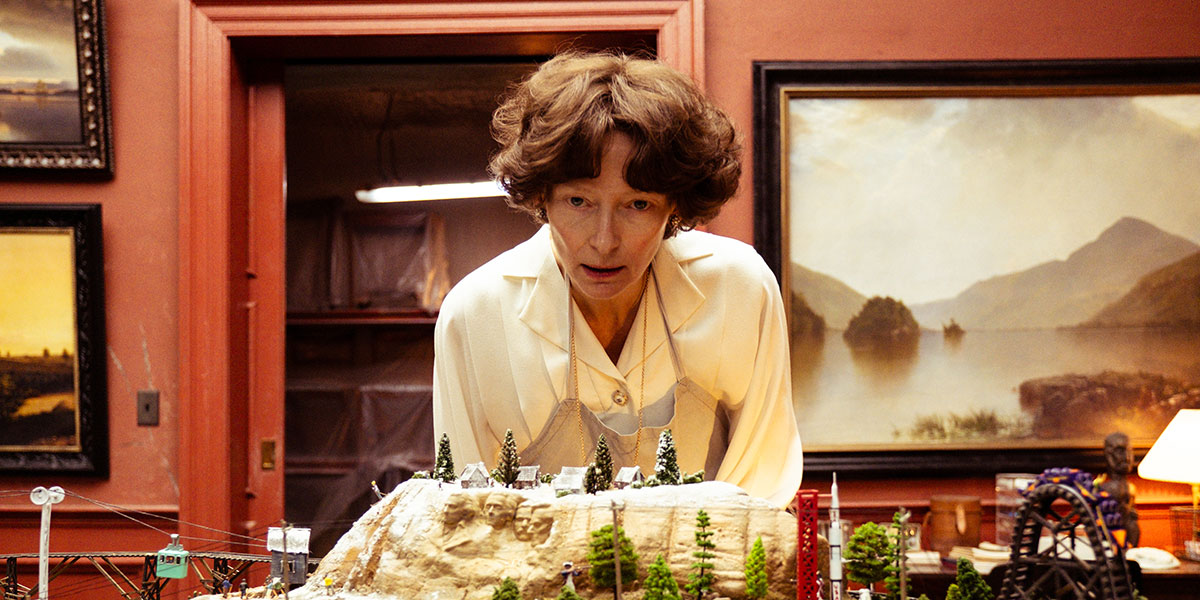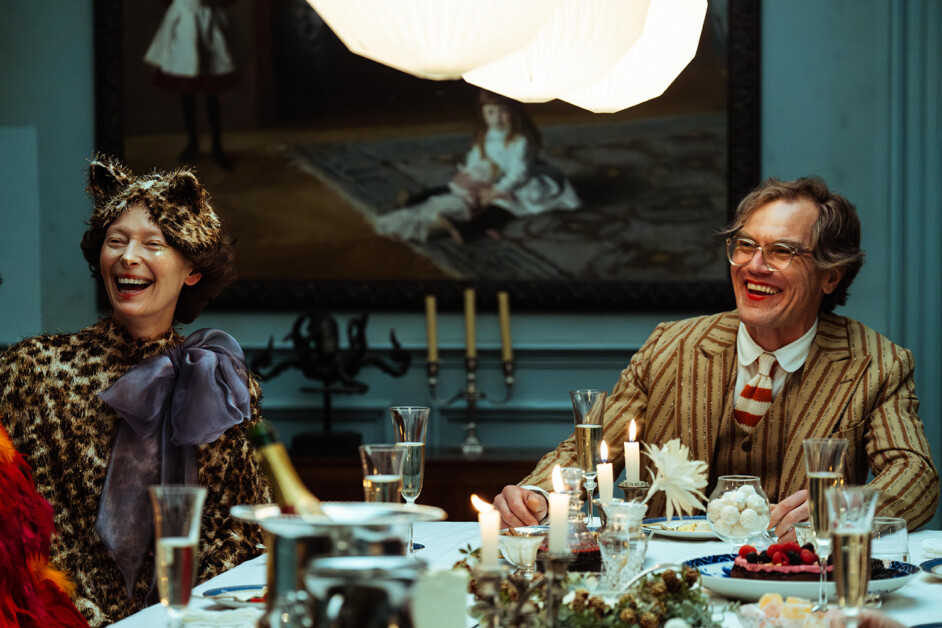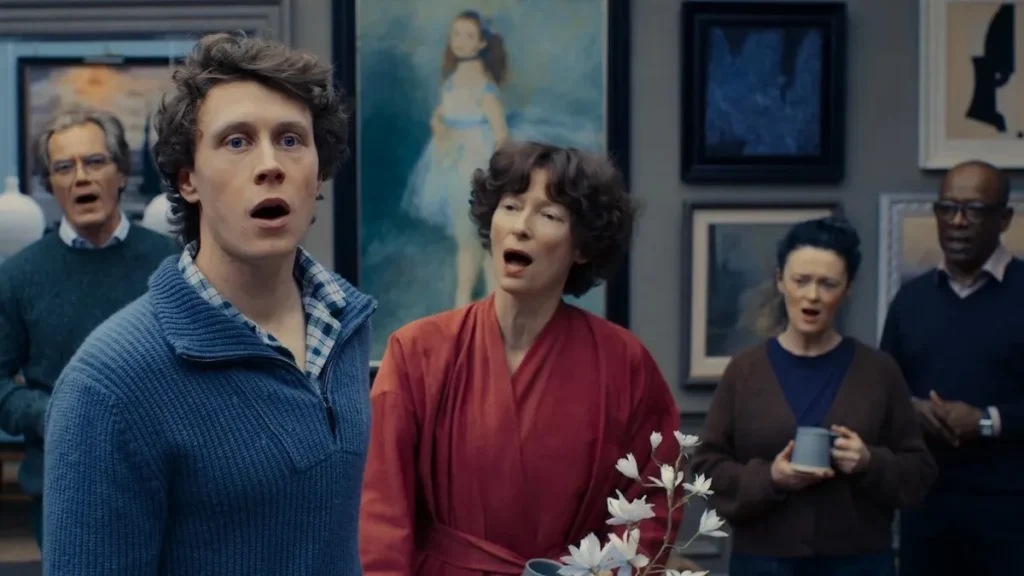Nicolas Paredas’ Lázaro at Night, which held its North American premiere on Saturday, Sept. 7 at the Toronto International Film Festival, is absolutely nothing like Joshua Oppenheimer’s The End. That’s a point that cannot be stressed enough. The former is about a trio of filmmaking friends who are all in love and reconsider their introductions to one another over the course of 76 minutes; the latter is a Golden Age musical set entirely in an underground bunker after the apocalypse has wiped out all of civilization. But it was impossible not to think about an idea Lázaro raised while contemplating The End: That when you look at a work of art, you enter the headspace of the artist that brought it to life. Of course, this same thought process could apply to any of the many films I’ve seen over the course of the last week. But it’s Oppenheimer’s singular invention that has had it banging around in my head the most. Whether or not it was trying to escape remains to be seen.
Perhaps it helped that prior to the screening, the documentarian-turned-Sondheimist addressed his film’s audience with encouragement for them to see his narrative debut as he sees it. “It’s a meditation on storytelling,” he said, “On how we tell stories to escape from ourselves… It’s about our awful human ability to lie to ourselves.” Oppenheimer went on to make a connection between his previous films, The Act of Killing and The Look of Silence, two powerful documentaries that, like The End, reckon with how those in power abuse their positions in order to perpetrate horrifying violence. After the screening, he added that the film is most certainly a climate change allegory and called for change, pointing out our society’s collective lack of action in regard to our decaying planet.
So while it is certainly a musical about a wealthy family who survived the end of the world and find themselves forced to consider their role in its calamitous fall after the unexpected arrival of an outsider, it’s safe to say that Oppenheimer has high hopes for The End’s ability to inspire contemplation on topics that might appear to be subliminal due to how they are communicated. For the most part, the film is successful in that goal, even as its messages are delivered through sing-songy show tunes from actors who probably don’t have a future on Broadway. The family’s nameless members, known solely as the Mother (Tilda Swinton), the Father (Michael Shannon), and the Son (George MacKay), spend most of the film strolling around their underground mansion – at least it looks like a mansion – and recalling memories of the old world in chorus. Once (or if) you’re able to get past the absurdity of an end-of-the-world movie being reimagined as a Rodgers and Hammerstein-esque musical, it’s both fascinating and enrapturing to watch a genre film of this sort take the form of what could reasonably be considered its inverse.

The times when it most feels like a true apocalypse film come after the Girl’s arrival. She’s played by Moses Ingram, and she somehow finds her way into the family’s compound. She lost her own family as the world ended around her, yet has survived God knows what for God knows how long, and has finally found a place that can serve as long-standing protection. Though the family, along with the three others who live with them – the Friend (Bronagh Gallagher), the Doctor (Lennie James), and the Butler (Tim McInnerny) – are initially hesitant to allow an outsider into their subterranean haven, they eventually cave and give her a place to live. For how long is not known, as the dynamic within this environment has now been disrupted, never to be the same again. How can a family, even one of means, who made it through an unpredictable time navigate more uncertainty in the place they’re meant to call home?
Little background is given regarding what exactly brought the world to its end, but there’s a lot of talk about wildfires coming in vicious spurts and it’s quite clear that the family had something to do with it. Not that they’re even remotely willing to acknowledge their faults, at least not at first. Father and Son spend most of their time co-writing a book about Father’s life as a fossil fuel baron who once had great power and responsibility in the energy industry (a domain he insists can’t yet be linked to the end of civilization, not without more proof). Mother, meanwhile, dedicates her days to her art collection; she is constantly rearranging their positions on the walls of the living room, rarely stopping to admire them. The study, where the Father and the Son write, is filled to the brim with books, none of which ever seem to be opened. The tunnels they’ve built wide enough for multiple cars to fit through – they still have many, despite having nowhere to go – weave off to a distant, unseen destination. These trappings – ingeniously designed by Jette Lehman – are the sort you’d only ever see at your richest friend’s childhood home, if that. It all reeks of complicity and obliviousness, a combination that only the most powerful tend to access, and never seem to recognize how vile such behavior is.
The End’s most interesting element is the Son, not least thanks to MacKay’s performance, the film’s best and most stage production-appropriate, but because he’s only ever known this world. His father’s claims that fossil fuels had nothing to do with the world’s climate cataclysm add up to him; he doesn’t know any better. As a young man who believes that the Chinese immigrants who built the Central Pacific Railroad would have smiles on their faces due to pride in their work, as he depicts them in the historical diorama of American life that he and his father work on when not writing the Great Apocalyptic Memoir, MacKay gives him an air that is perpetually-naive. He would (and very well may) be infuriating as all get out if not for his blissful ignorance, a boy stuck in a 25-year-old’s body, one that has never had to endure struggle a day in his life.

The nature of existence is only questioned once the Girl enters the picture, and MacKay and Ingram have a charming chemistry that can only be described as that of babysitter and sittee. Her attempts to open his eyes to what actually unfolded in the world before he entered it might be fool’s errands, but they provide a necessary counterargument to the rose-colored opinions that the family has convinced themselves to be the truth. It’s in these challenging exchanges – and occasionally, songs – that the script, co-written by Oppenheimer and Rasmus Heisterberg, is at its strongest, a true dissection of the nature of abatement. The Mother’s initial response to the Girl’s arrival is tepid, partially because she’s an outsider, and partially because she’s a Black outsider. But she also represents an obstacle lying in the way of their insensitivity. One of The End’s most clever details is the family’s insistence on continuing to celebrate all holidays, something the Girl questions, further bringing to light the fact that these people are so removed from the realities of the world, and perhaps always have been. They don’t apply to them. They dress up like caricatured pilgrims on Thanksgiving and hang wreaths at Christmas, all in an effort to forget the things they never learned in the first place.
These are profound ideas as long as you’re oblivious to the evils of the rich and mighty, but Oppenheimer still manages to mine specific criticisms out of them in relation to his characters. It would be reasonably scathing coming from a traditional drama; it’s certainly more surprising in a musical, not because it’s satirical in any sense, but because there’s a soothing beauty to Joshua Schmidt and Marius de Vries’ composition that helps make the film’s observations feel that much more analytical. And please, trust that when I say that The End is a musical, I don’t mean that it’s a movie in which an actor or two sings a song or two. This is a full-blown movie musical, one that is sung, danced, and often spoken in the vein of a Golden Age production a la Oklahoma! or Guys and Dolls. Given that it’s Oppenheimer’s first work of fiction, to call it a bold choice would be the equivalent of calling Killing or Silence comedies. So, the fact that the tunes tend to work musically is as shocking as they are digestible.

The returns on what the lyrics actually have to say are bound to be slightly more diminishing. Not only do some of the songs sound as though dialogue has been transposed onto sheet music and haplessly orchestrated with a band in the background and a few rhyming words added in, but most of them are ruminative anthems on the family’s memories of yore. It tends to get repetitive, as if Oppenheimer had only ever heard one kind of showtune. Then again, The End is about what happens after all is lost, when all that’s left to do is think about better days. In that sense, it makes sense for the film’s songs to match its one. Still, you won’t be alone if you find yourself half expecting a scene to come along where one character cradles another while singing, “No one’s gonna harm youuuu, not while I’m arouuuuuund.”
There’s some truth to that. Precious few are physically harmed in the proceedings of The End, thanks entirely to the security blanket that its characters are wrapped in, as snug as bugs in a rug. But when harm is done, it’s in the form of implication. In another’s manipulation; in one’s involvement in unspeakable tragedy; in an overarching refusal to admit the truth. As Oppenheimer noted both before and after Wednesday night’s Canadian Premiere screening, that’s our foremost responsibility in the world. The End isn’t interested in showing you how best you can serenade your way through secrets and lies. It’s eager to convince you that doing so is just as bad as the act itself.
The End held its Canadian Premiere as part of the Special Presentations section at the 2024 Toronto International Film Festival. The film will be released by NEON exclusively in select theaters on December 6, 2024.
Director: Joshua Oppenheimer
Writers: Rasmus Heisterberg, Joshua Oppenheimer
Rated: NR
Runtime: 148m
The End isn’t interested in showing you how best you can serenade your way through secrets and lies. It’s eager to convince you that doing so is just as bad as the act itself.
-
GVN Rating 8
-
User Ratings (1 Votes)
4.8
Will Bjarnar is a writer, critic, and video editor based in New York City. Originally from Upstate New York, and thus a member of the Greater Western New York Film Critics Association and a long-suffering Buffalo Bills fan, Will first became interested in movies when he discovered IMDb at a young age; with its help, he became a voracious list maker, poster lover, and trailer consumer. He has since turned that passion into a professional pursuit, writing for the film and entertainment sites Next Best Picture, InSession Film, Big Picture Big Sound, Film Inquiry, and, of course, Geek Vibes Nation. He spends the later months of each year editing an annual video countdown of the year’s 25 best films. You can find more of his musings on Letterboxd (willbjarnar) and on X (@bywillbjarnar).






